Try A Full Regimen AND REVEAL YOUR BRIGHTEST SKIN YET!
Pure. Powerful. Proven.
No harsh chemicals, no fillers, no synthetic fragrances—just high-performance botanicals designed for real results.

What If Achieving Radiant, Youthful Skin Was Easier Than Ever?
With Annmarie Skin Care, you can experience natural, wildcrafted, effective skin care that transforms your skin within a week!
- pH-Balanced Cleansing – Gently cleanse while nourishing, hydrating, and refreshing your skin, leaving it soft and balanced after every wash.
- Antioxidant-Rich Extracts – Fight environmental stressors while visibly firming and tightening your skin for a youthful, lifted look.
- Wildcrafted & Organic Ingredients – Formulated with sustainably sourced, nutrient-dense botanicals, MADE SAFE® certified for a pure, toxin-free skin care experience.
- No Compromise on Quality – Experience high-performance, luxury spa results at an accessible price—because clean beauty should never mean sacrificing effectiveness.
- The result? Radiant, glowing, youthful skin that looks as healthy as it feels—naturally.
Meet Annmarie Skin Care–The Experts In Pure, Effective Skin Care
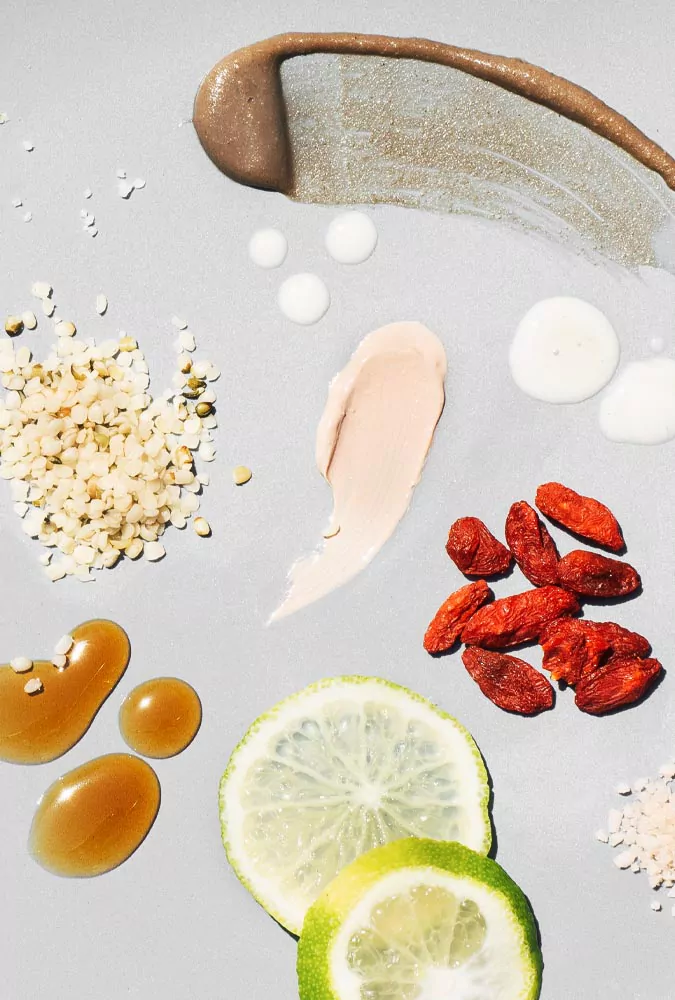
Founded in 2009, our mission has remained the same: to redefine clean beauty with skincare that is as effective as it is pure. Every formula is handcrafted with a level of care that sets us apart.
Hand-Selected Ingredients – We carefully choose each botanical for its potency and skin-enhancing benefits.
Nutrient-Rich Infusions – Ingredients are infused into nourishing base oils and aloe vera juice to maximize absorption and efficacy.
Powerful Plant Extracts – Harnessing antioxidants, vitamins, and phytonutrients to protect, replenish, and restore skin.
The result? A skin care line that delivers real, visible results—glowing, healthy skin that reflects the expertise and integrity behind every product.
Crafted with purpose. Backed by botanicals. Inspired by nature.
What Makes Annmarie Skin Care Different?
At Annmarie Skin Care, we don’t just create clean beauty products—we set the standard for truly effective, plant-powered skincare. Our commitment to purity, potency, and transparency ensures that every drop of our formulations nurtures your skin without compromise.
Pure Ingredients, Proven Results—Certified MADE SAFE® and 100% Non-GMO
Beyond Organic–We go beyond choosing organic by sourcing wildcrafted ingredients. We partner with farmers whose agricultural production excludes the use of synthetic substances, such as pesticides, synthetic medicines or fertilizers, and genetically modified organisms, to source only the highest-vibration herbs and plant extracts.
Minimal Processing, Maximum Efficacy–Our ingredients are processed as close to nature as possible, ensuring their nutrients remain potent and bioavailable.
Cutting-Edge Extraction Methods–We use CO2 extraction, cold-pressing, and pure distillation to preserve the integrity of every botanical.
Radical Transparency and Truly Clean Formulas
No Fillers. No Toxins. No Hidden Ingredients. Every single component is clearly listed—because you deserve to know exactly what you’re putting on your skin.
Annmarie Skin Care isn’t just natural—we raise the bar beyond clean beauty standards.
Experience skin care so pure, you could eat it!
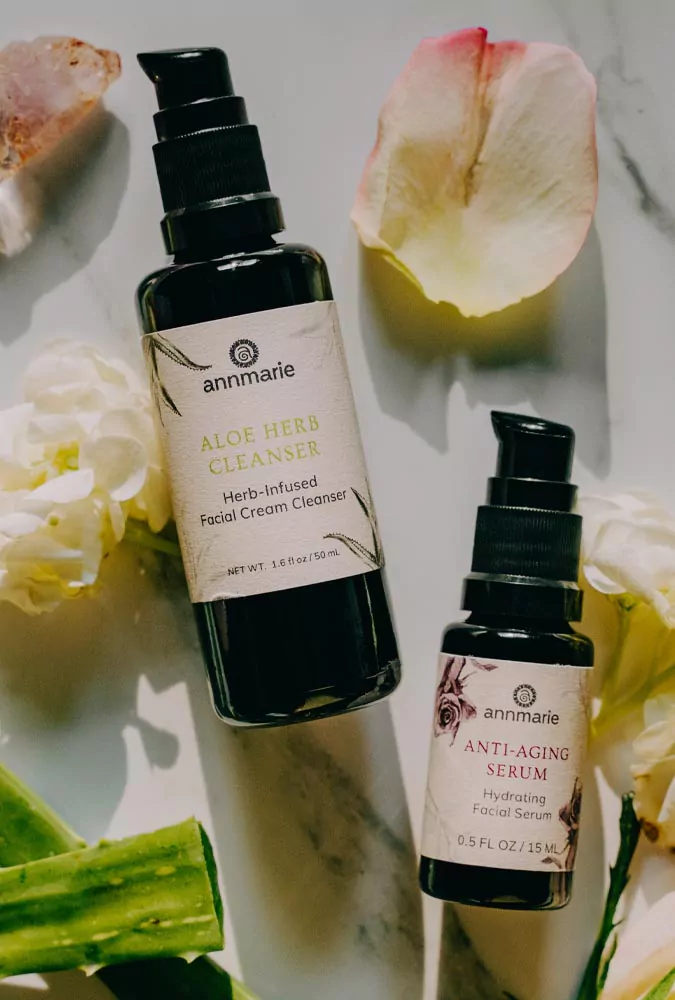
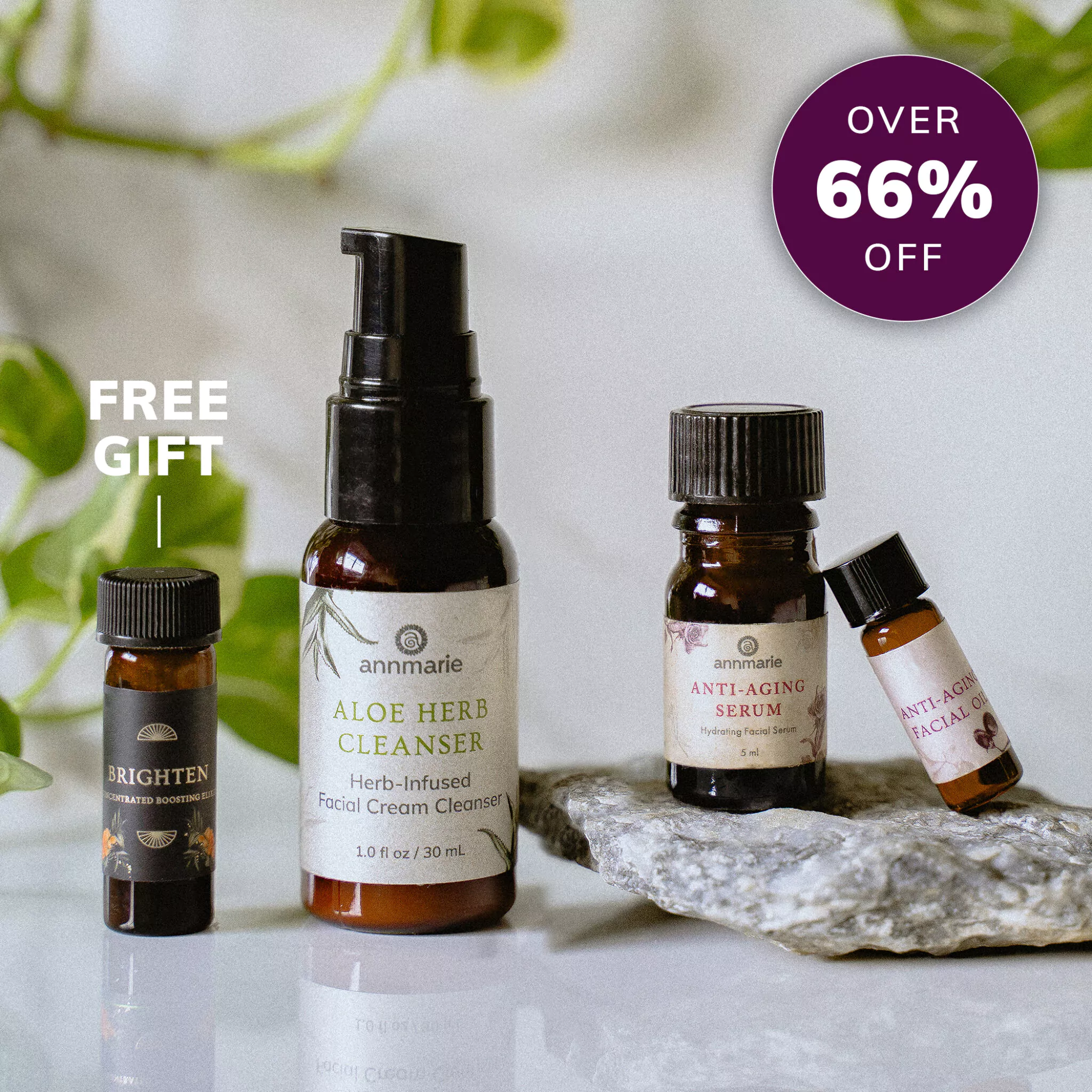
Get a complete Annmarie Skin Care regimen today!
MADE SAFE® Certified | 100% Non-Toxic | Crafted with a 3-Step Energized Botanical Infusion Process
$66→ONLY $21.99 + 3 PIECE TRIAL + FREE GIFT + FREE SHIPPING! *
Reveal brighter, firmer, and healthier-looking skin with nature’s most potent botanicals.
Visible Results–Reveal deeply hydrated, smoother fine lines, and restoring skin’s natural glow.
Pure and Powerful–Organic and wildcrafted botanicals for naturally handcrafted skin care. Formulations are created to nurture all skin types for ageless results.
Consciously Crafted–Sustainably sourced and packaged. Since Day 1—Annmarie Skin Care has promised to create products that are safe for you and healthy for the planet.
What's Included In This Exclusive Offer:
- Aloe Herb Cleanser–A soothing, pH-balanced formula with organic aloe vera, coconut oil, and beautifying herbs to cleanse and hydrate without stripping your skin.
- Anti-Aging Serum–A luxurious, fast-absorbing elixir infused with hyaluronic acid and life-everlasting flowers to plump and firm skin.
- Anti-Aging Facial Oil–A nutrient-rich blend of chia, goji berry, and broccoli seed oils that deeply nourish, tighten, and replenish skin’s natural elasticity.
- Brighten-Vitamin C With Seabuckthorn (FREE – $15 value!)–A potent daily brightening elixir enriched with sea buckthorn berry CO2 extract to reduce the look of dark spots and restore your skin’s natural radiance. Formulated with Tetrahexyldecyl Ascorbate (THDA), a plant-derived and non-GMO Vitamin C, this ultra-potent formula visibly evens out skin tone.
- BONUS: FREE SHIPPING!* – Because great skin care should come with no extra costs.
Act now—this exclusive offer won’t last!
Give your skin the love it deserves and get everything for just $21.99 today!
No commitment. No subscription. No risk.
*Shipping available worldwide. FREE SHIPPING US only.
As seen in







KRIS CARR
New York Times Best-selling Author, Wellness Activist

“I'm a loyal fan of Annmarie's beautiful, products made with organic ingredients. I've been using them for over a decade and my skin has never looked or felt better!*”
DR. MARK HYMAN
New York Times Best-selling Author, Health Expert

“These products are natural and chemical free, totally in alignment with my health recommendations. And they are far more effective than anything I've seen in my 20 years of practice. They smell and feel amazing, and they really work.*”
*Specific results are not guaranteed. Actual results may vary.
Shown above are our very own Annmarie Skin Care customers.
Full Regiment of Wildcrafted, Age-Defying Skin Care for Brighter, Healthy-Looking Skin
Nourish, protect, and replenish your skin with clean, consciously crafted skin care made from nature’s purest ingredients. This exclusive collection is designed for those who value sustainability and effectiveness—delivering deep hydration and a soft, luminous glow without harmful chemicals or synthetic fillers. While ideal for dry skin, these wildcrafted formulas are gentle enough for all skin types.
Today Only – Save 67% on Annmarie Skin Care’s Most Loved Products!
Experience the transformative power of pure, organic and wild crafted skin care in this exclusive Clean Beauty Routine, plus enjoy your free gifts and visible results!
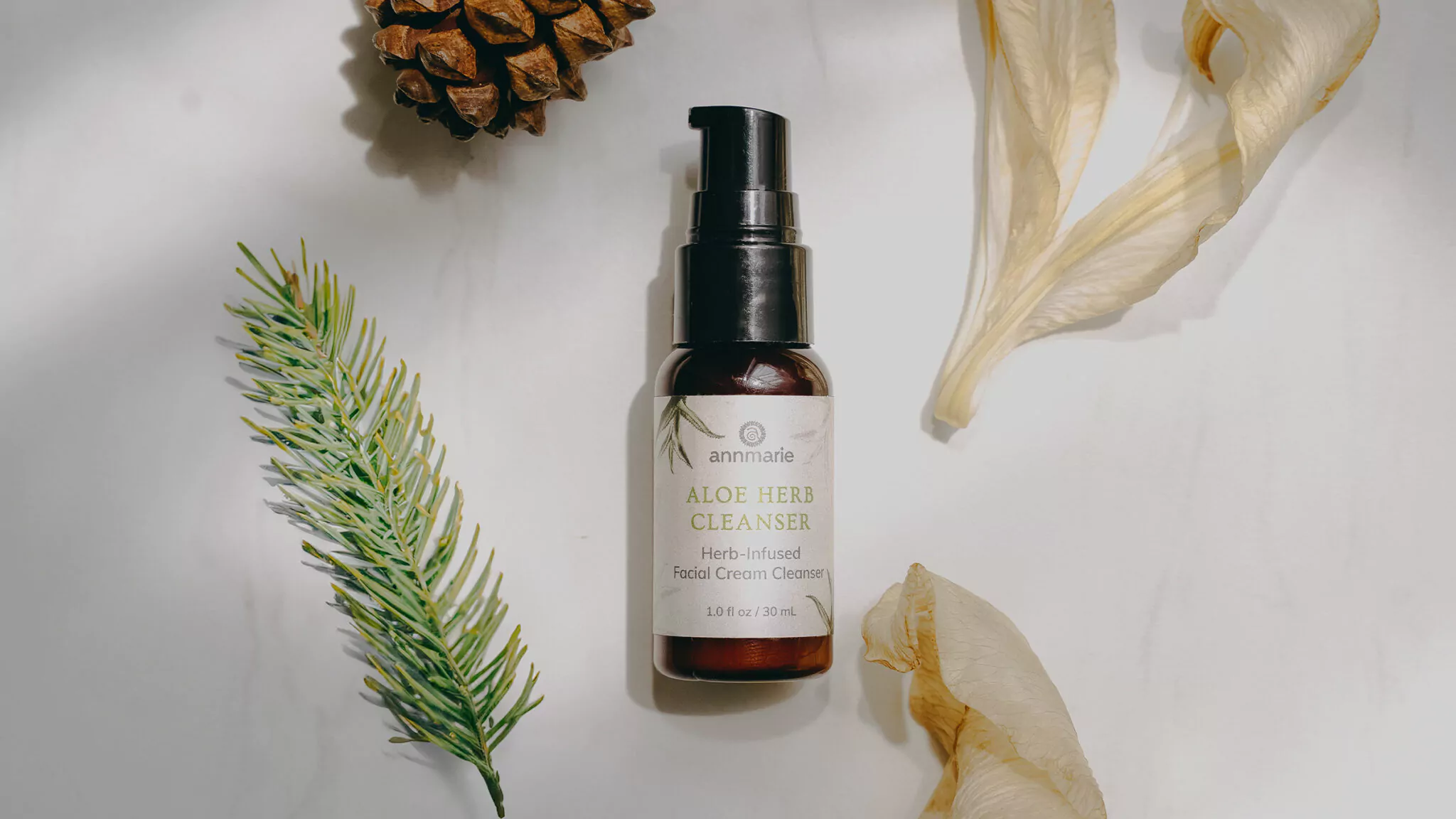
Aloe Herb Cleanser: Purify, Cleanse and Restore
Our Aloe Herb Cleanser (trial size) is gentle, effective, lightweight, and impactful. This pH-balanced elixir is formulated to purify and moisturize all skin types while removing makeup and buildup. Plus it’s a joy to the senses, given its citrus-scented infusion of organic aloe vera, creamy coconut oil, and soothing calendula flowers. Let your skin breathe again.
KEY INGREDIENTS
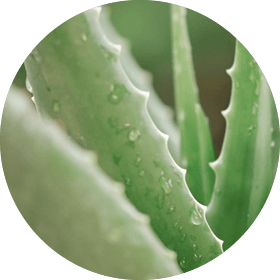
Aloe Vera
Our certified organic aloe vera is derived from the whole and inner leaf of the plant, then freeze dried to retain all of the essential vitamins, minerals, phytonutrients and enzymes. This potent, synergizing plant is where our biocompatible ingredients thrive.
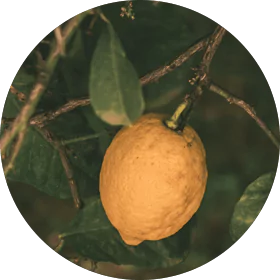
Lemon Essential Oil
Balance your complexion’s natural oils with a purely sourced dose of citrus-powered purification known to brighten, clear, and refine skin.
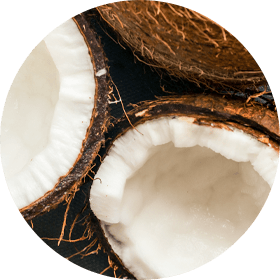
Coconut Oil
Nourishment comes naturally from pure, nutrient-rich coconut oil. Restore your complexion with superior moisturization to fight dehydration and environmental stressors.
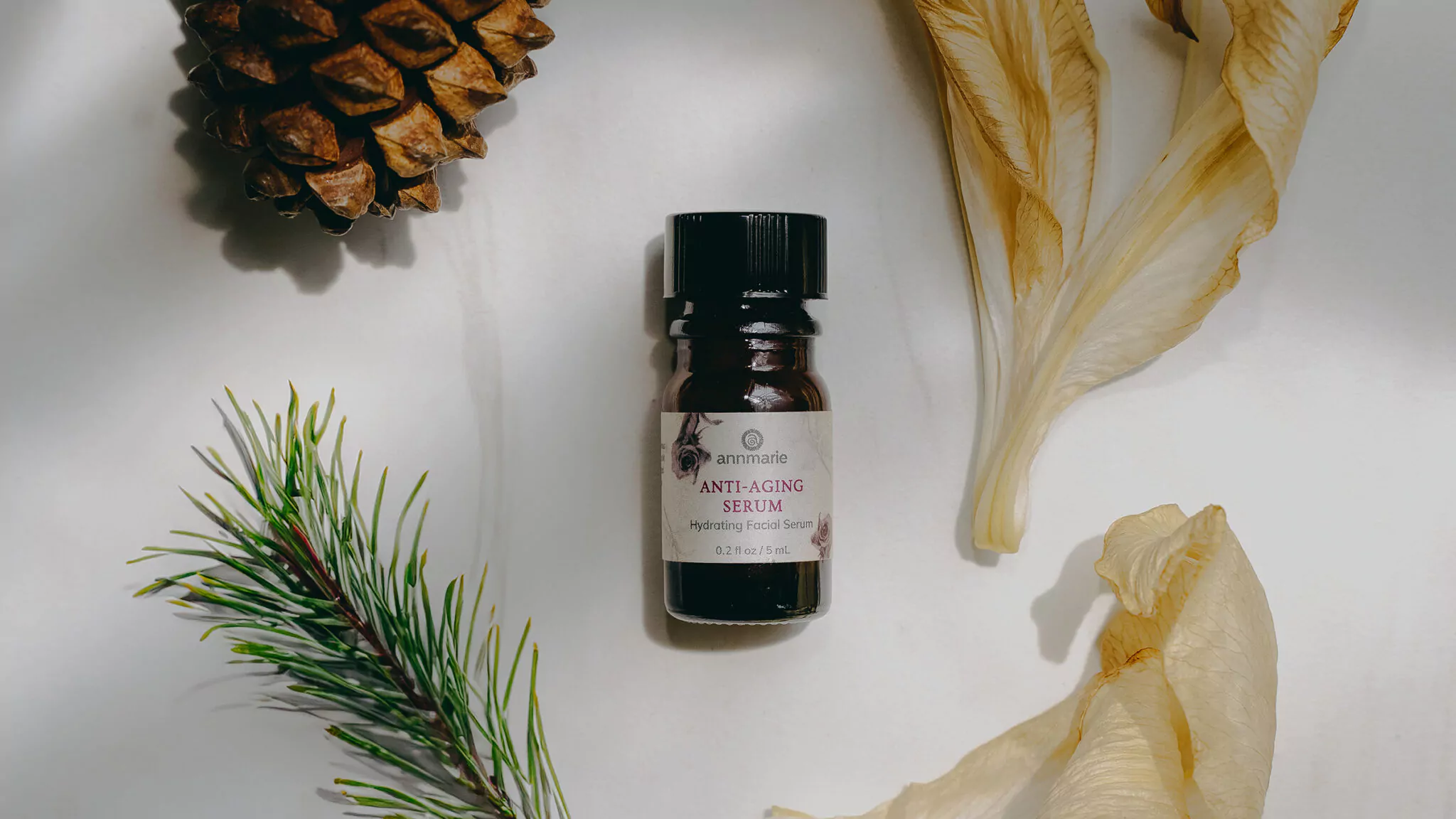
Anti-Aging Serum: Brightens, Hydrates and Glistens
Your skin can always use a multivitamin elixir like the Anti-Aging Serum (trial size), beloved for its ability to soften and tighten your look. It’s infused with non-GMO hyaluronic acid, organic sunflower seed oil, ginkgo leaf, and life-everlasting flowers for bouncy, firmer-feeling skin.
Plus it’s packed with antioxidant-rich herb extracts of buddleja davidii and edelweiss to boost the skin’s natural defenses and protect it from environmental stressors.
KEY INGREDIENTS
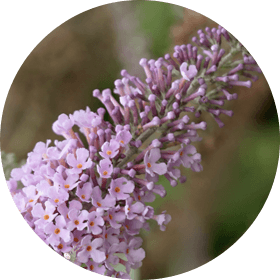
Buddleja Extract
This antioxidant-rich extract is the ideal ingredient for fighting the environmental stressors that cause the appearance of aging.
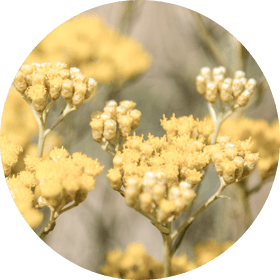
Life Everlasting Flowers
Life everlasting flowers are abundant in natural fatty acids ursolic and oleanolic, which have potent antioxidant and skin-defensive properties.
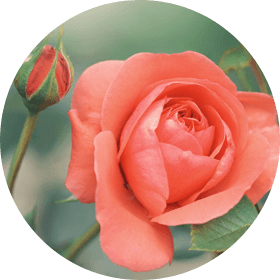
Rose Distillate
This delicate hydrosol is the steam captured from the distillation process of extracting pure rose essential oil. Rose helps to nurture and soothe the appearance of temporary redness, while its aromatherapeutic quality provides balance to the mind, body and spirit.
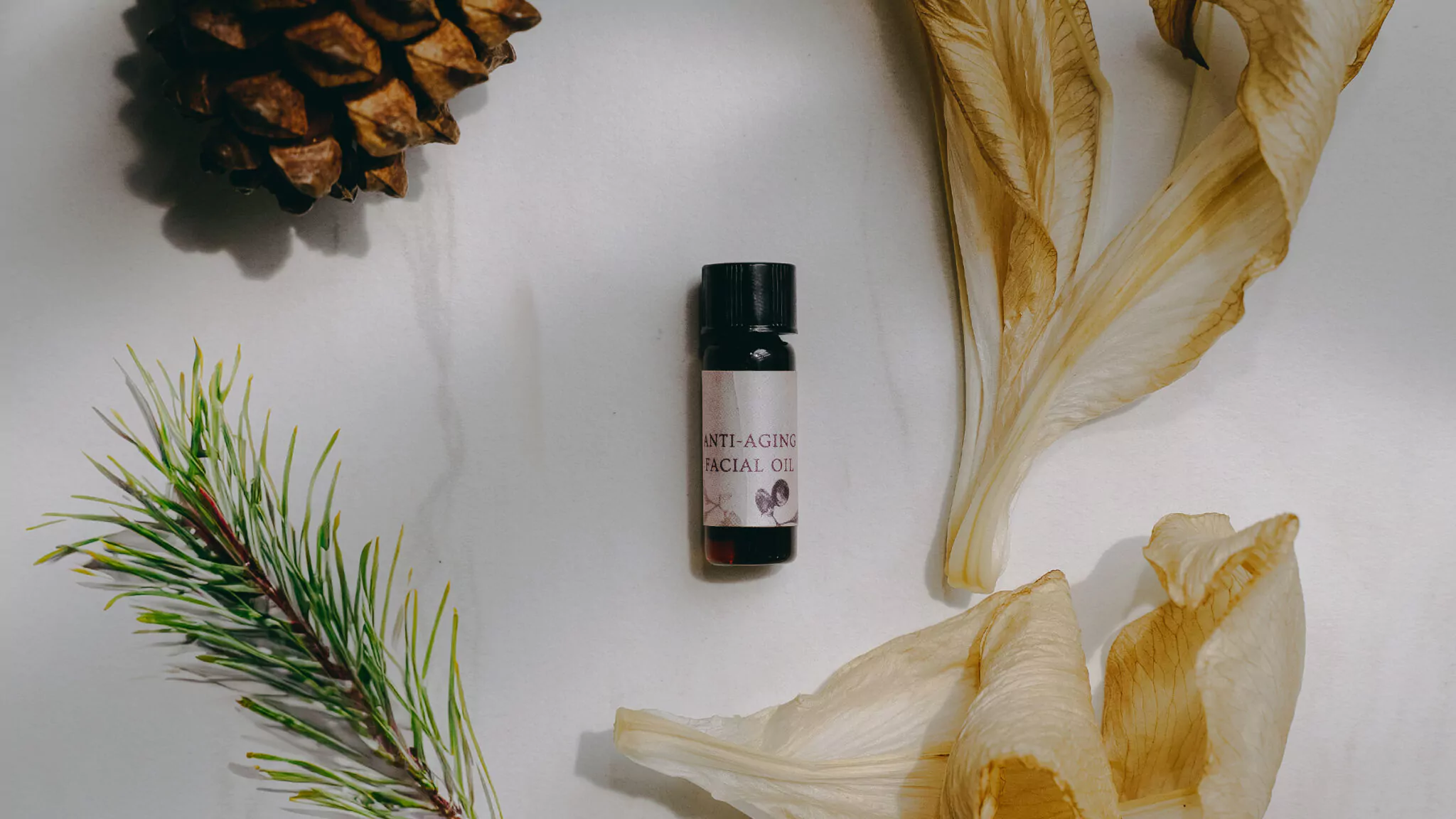
Anti-Aging Facial Oil: Moisturizes and Promotes Flawless Skin
Our best-selling Anti-Aging Facial Oil softens, moisturizes, and promotes flawless skin. It rounds off your self-care ritual with nourishing jojoba oil, beautifying rose distillate, and antioxidant-rich goji berries. They’re known to reduce the appearance of fine lines and wrinkles by delivering intense moisture to keep mature skin supple and dewy.
KEY INGREDIENTS
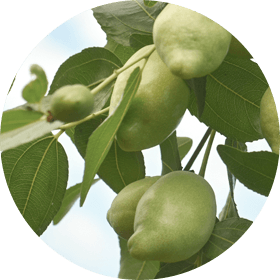
Jojoba Oil
Jojoba oil closely resembles the texture of the skin’s natural oil, and its status as a protective emollient ensures optimum, nutrient-dense replenishment.
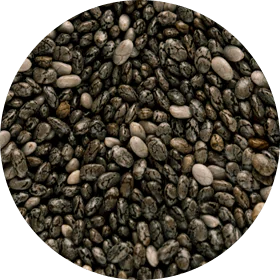
Chia Seed Oil
An ultra-moisturizing superfood is renowned for its restorative properties. It is considered one of the richest botanical sources of omega-3 fatty acids found in nature, and contains an abundance of vitamin B3 and zinc that bode well for the skin’s plumpness and resilience.
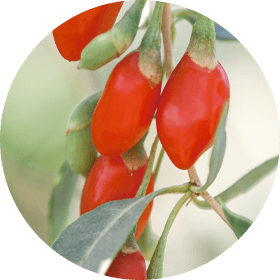
Goji Berries
One of the most powerful antioxidant-rich superfoods in the world, teeming with essential trace minerals, amino acids, and vitamin C. Our goji berries are sourced from the Himalayas and grown in high altitudes to preserve the berry's natural vibration.
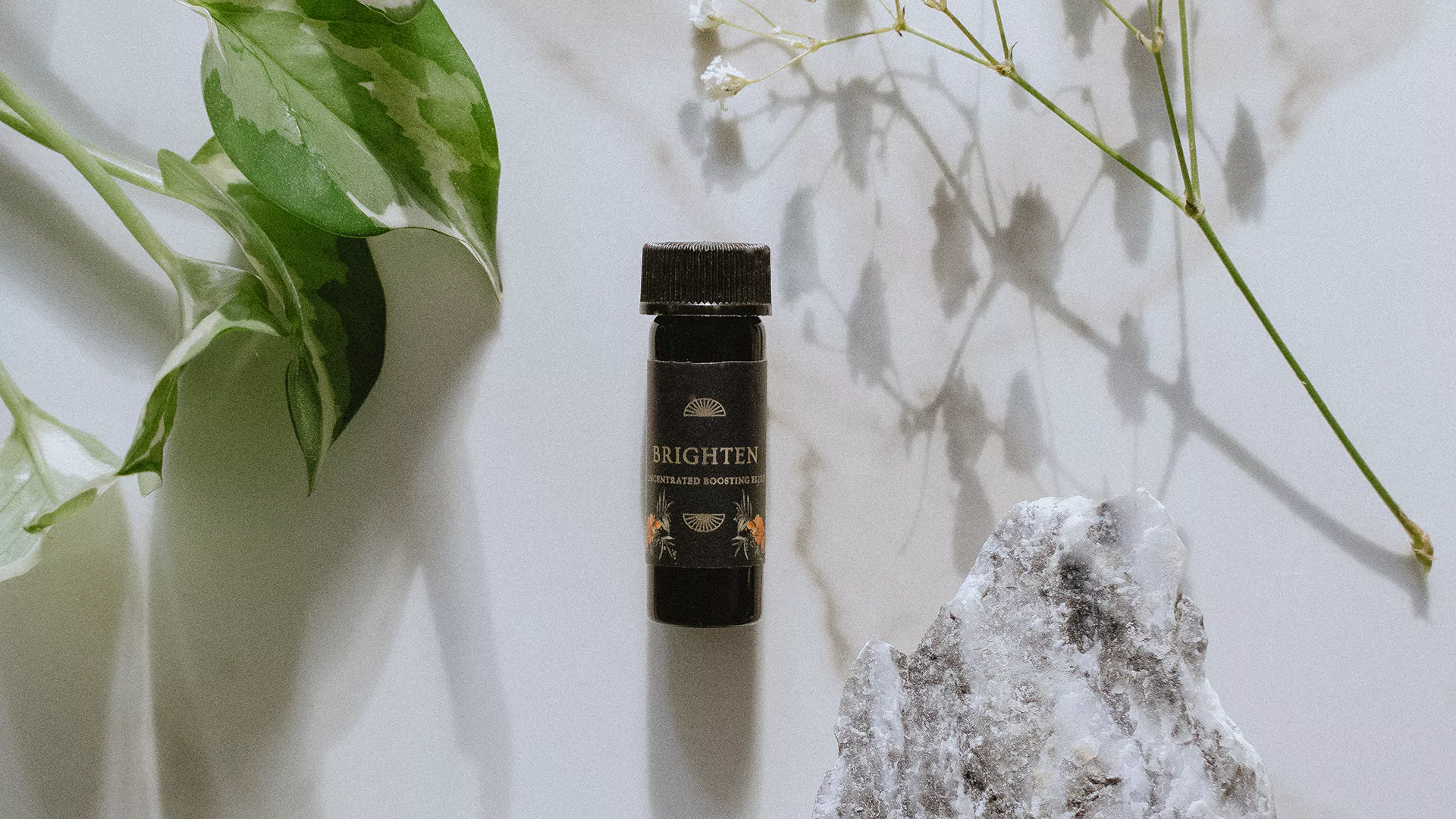
Brighten – Vitamin C With Seabuckthorn: Noticeably Brightened Skin
Unleash radiant, youthful-looking skin with just a few drops of this ultra-potent, high-performance brightening elixir. Infused with MADE SAFE® approved ingredients, this formula delivers powerful antioxidant protection, deep nourishment, and visible skin-brightening results—all while being gentle enough for daily use.
KEY INGREDIENTS
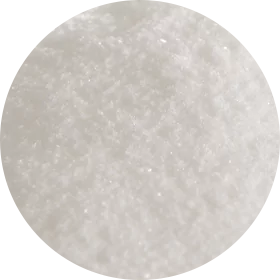
Vitamin C
Vitamin C can help improve the appearance of skin's texture, tone, and clarity, all while being incredibly antioxidant-rich. Vitamin C is a nutrition boost for dehydrated and aging skin and temporary redness.
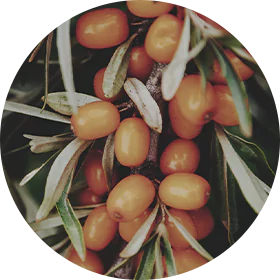
Seabuckthorn Berry
A skin-rejuvenating superfruit that boasts multiple vitamins (A, B, C, D, E) and a trio of powerful omegas, including the rare omega-7 essential fatty acid—which firm and hydrate fine lines.

LIMITED-TIME OFFER: Get 3 Potent Organic Skin Care Products + a FREE Brighten – Vitamin C With Seabuckthorn!
Treat yourself to this exclusive skin care set designed to revitalize, nourish, and restore your skin’s natural glow—for just $21.99 instead of $66!
Experience Real Results with Trial Sizes – Perfect for discovering the power of Annmarie Skin Care before committing to full sizes.
What This Collection Can Do For Your Skin:
Don’t Miss Out—Claim Your Exclusive Set Now!
Pamper with luxurious skin care and, for a LIMITED TIME, receive a FREE Brighten – Vitamin C With Seabuckthorn ($15 value)!
HOW TO USE THE CLEAN BEAUTY ROUTINE
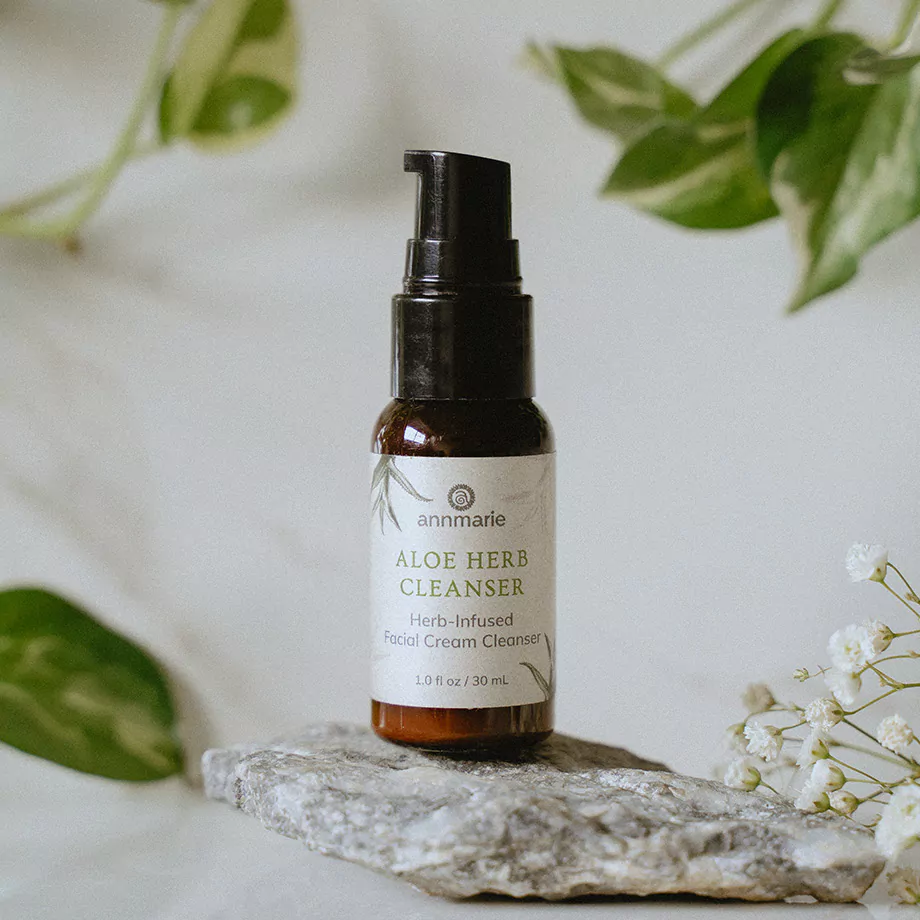
STEP 1 /
Aloe Herb Cleanser
Apply to damp skin, massage into face, and rinse. For deeper exfoliation, use with a face brush.
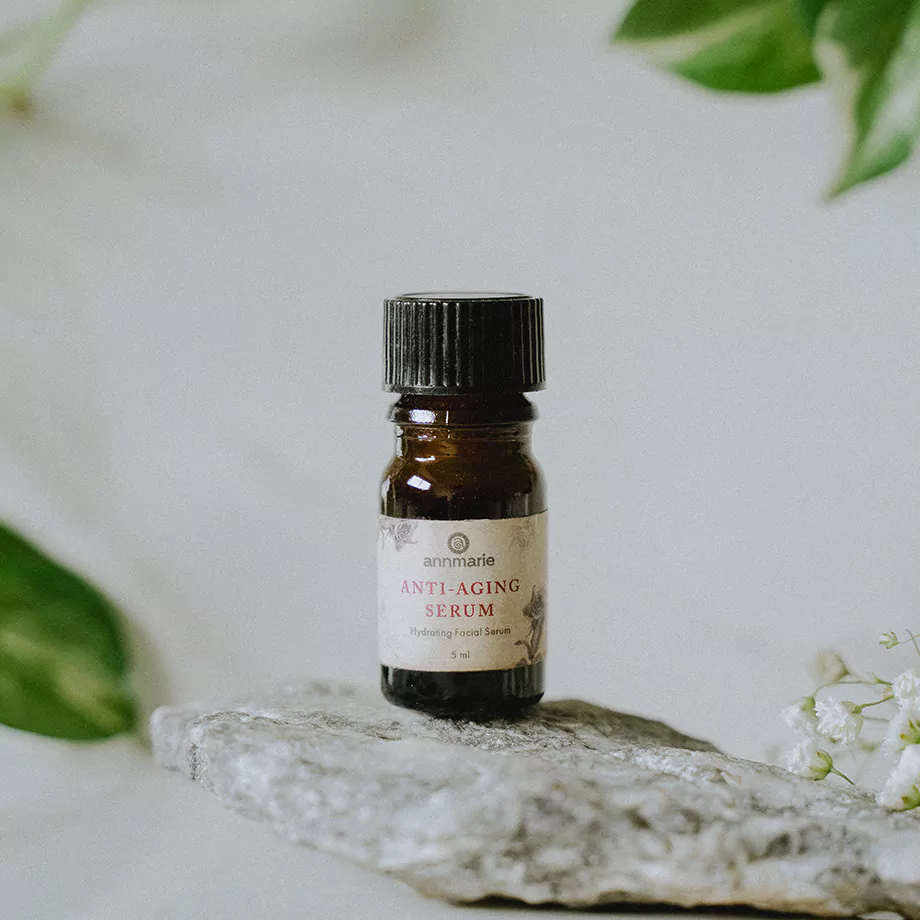
STEP 2 /
Anti-Aging Serum
Apply to clean skin. Drop a generous amount into palm of hand. Dab a bit on the nose, chin, cheeks, and forehead. Blend well. Best used before your Anti-Aging Facial Oil.
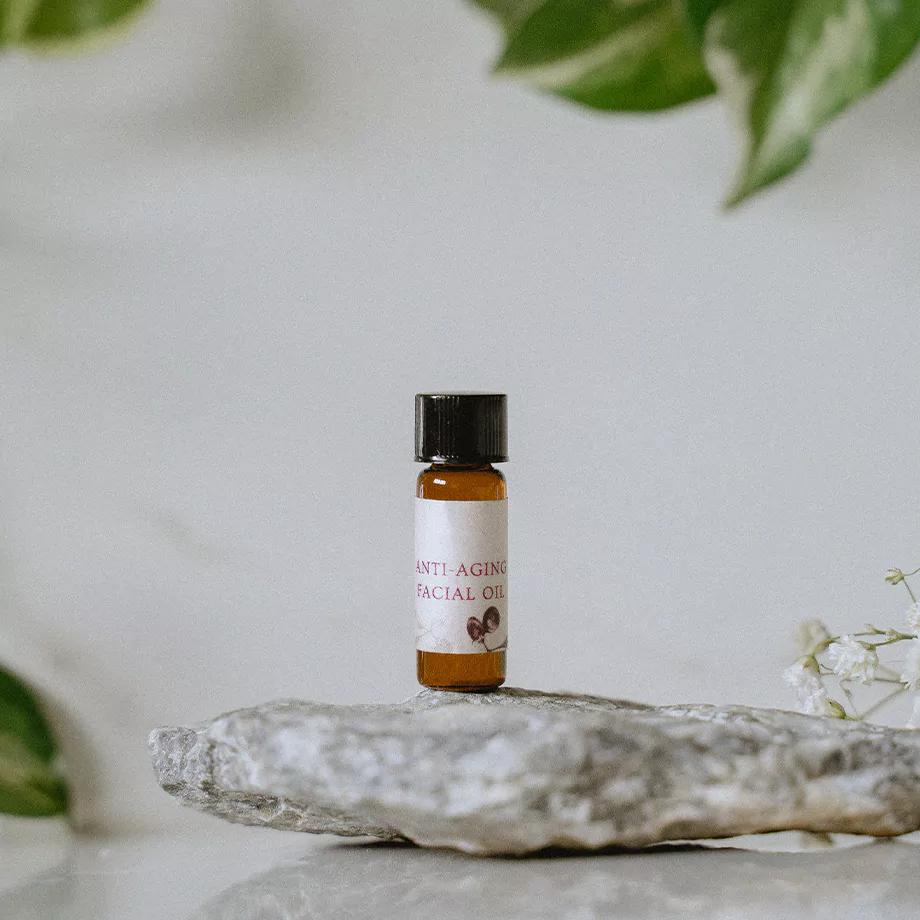
STEP 3 /
Anti-Aging Facial Oil
Apply to clean skin or over serum. Drop 1 to 2 full drops into palm of hand. Dab on the nose, chin, cheeks, and forehead. Blend with gentle strokes.
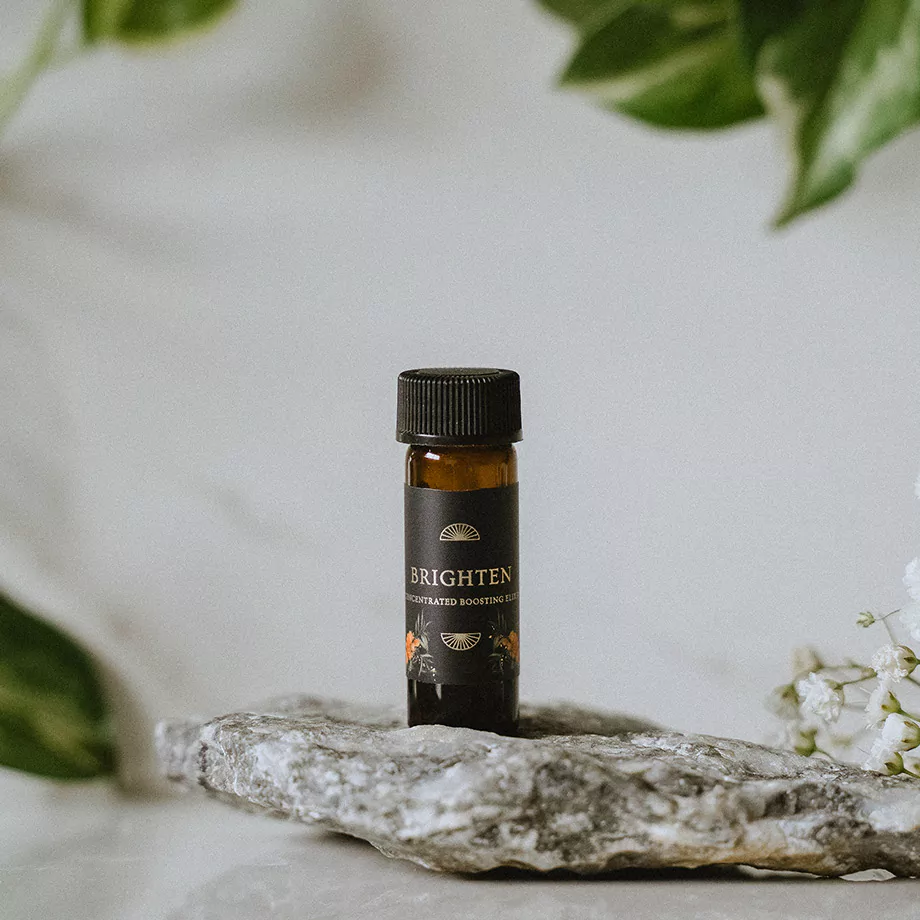
FREE GIFT /
Brighten – Vitamin C With Seabuckthorn
Use AM. Dap Brighten with your preferred facial serum or 1-2 pumps of your preferred facial oil in the palm of your hand. Apply to the skin with gentle upward strokes. Note: This is a concentrated elixir and should never be applied directly to the skin.
WHAT MAKES US DIFFERENT?
OUR 3-STEP
ENERGIZED BOTANICAL INFUSION PROCESS
WILDCRAFTED:
FULL INGREDIENT LIST
Aloe Herb Cleanser
*Aloe barbadensis (aloe vera) leaf juice, *Cocos nucifera (coconut) oil, [Sodium lauryl glucose carboxylate, Lauryl glucoside (saponified oils of coconut oil and plant starches/sugars)], Herb-infused aloe vera juice [*Aloe barbadensis (aloe vera) leaf juice, *Calendula officinalis (calendula) flower extract, *Hyssopus officinalis (hyssop) extract, *Lavandula angustifolia (lavender) flower extract, *Melissa officinalis (lemon balm) leaf extract, *Helichrysum arenarium (life everlasting) flower extract, *Azadirachta indica (neem) leaf extract, *Olea europaea (olive) leaf extract], *Glycerin (vegetable derived), Populus tremuloides (aspen) bark extract, Essential oils [Citrus paradisi (ruby grapefruit), Citrus limon (lemon), Citrus reticulata (green mandarin)], Xanthan gum (wood pulp derived), CO2 extract [*Rosmarinus officinalis (rosemary)]. *Organically grown or wildcrafted
Anti-Aging Serum
*Aloe barbadensis (aloe vera) leaf juice, Serum blend [*Aloe barbadensis (aloe vera) leaf juice, *Squalane (plant sugar derived), Carrageenan (chondrus crispus), non-GMO xanthan gum], *Rosa damascena (rose) distillate, Herb-infused aloe vera juice [*Aloe barbadensis (aloe vera) leaf juice, *Emblica officinalis (amla) fruit extract, *Calendula officinalis (calendula) flower extract, *Symphytum officinale (comfrey) leaf extract, *Foeniculum vulgare (fennel) seed extract, *Ginkgo biloba (gingko) leaf extract, *Centella asiatica (gotu kola) leaf extract, *Equisetum arvense (horsetail) leaf extract, *Helichrysum arenarium (life everlasting) flower extract, *Silybum marianum (milk thistle) seed extract, *Urtica dioica (nettle) leaf extract, *Plantago lanceolata (plantain) leaf extract, *Rhodiola rosea (rhodiola) root extract, *Aspalathus linearnis (rooibos) leaf extract, *Rosmarinus officinalis (rosemary) extract, *Schizandra chinensis (schisandra) fruit extract], Aqua (water) and *Glycerin (vegetable derived) extracts [*Helianthus annuus (sunflower) seed, *Buddleja davidii, *Leontopodium alpinum (edelweiss)], Populus tremuloides (aspen) bark extract, *Glycerin (vegetable derived), Aqua (water) and *Glycerin (vegetable derived) extract [*Rubus idaeus (red raspberry) seed], Sodium ascorbate (mineral salt), Aqua (water) and *Glycerin (vegetable derived) extract [*Linum usitatissimum (flax) seed], *Salvia hispanica (chia) seed oil, *Calophyllum tacamahaca (tamanu) seed oil, Tocopherol (non-GMO vitamin E), Xanthan gum (wood pulp derived), Sodium hyaluronate (hyaluronic acid), CO2 extracts [*Rosmarinus officinalis (rosemary), Rosa rubginosa (rosehip seed)], Essential oils [Vetiveria zizanoides (vetiver), Boswellia carterii (frankincense), Opoponax (sweet myrrh), *Rosa centifolia (rose absolute), *Jasminum sambac (jasmine sambac absolute)]. *Organically grown or wildcrafted
Anti-Aging Facial Oil
*Helianthus annuus (sunflower) seed oil, Herb-infused oil [*Simmondsia chinesis (jojoba) seed oil, *Sesamum indicum (sesame seed) oil, *Calendula officinalis (calendula) flower extract, *Symphytum officinale (comfrey) leaf extract, *Symphytum officinale (comfrey) root extract, *Echinacea purpurea (echinacea) extract, *Ginkgo biloba (gingko) leaf extract , *Lycium chinense (goji berry) fruit extract, *Centella asiatica (gotu kola) leaf extract, *Hibiscus sabdariffa (hibiscus) flower extract, *Lavandula angustifolia (lavender) flower extract, *Melissa officinalis (lemon balm) leaf extract, *Glycyrrhiza glabra (licorice) root extract, *Helichrysum arenarium (life everlasting) flower extract, *Nelumbo nucifera (lotus) stamen extract, *Plantago lanceolata (plantain) leaf extract, *Rhodiola rosea (rhodiola) root extract, *Aspalathus linearnis (rooibos) leaf extract, *Rosa centifolia (rose) flower extract, *Rosmarinus officinalis (rosemary) extract, *Camellia sinesis (green tea) leaf extract, *Equisetum arvense (horsetail) leaf extract, *Viola tricolor (violet) extract, *Euterpe oleracea (acai) fruit extract, *Emblica officinalis (amla) fruit extract, *Withania somnifera (ashwagandha) root extract, *Boswellia serrata (frankincense) extract, *Silybum marianum (milk thistle) seed extract], *Cannabis sativa (hemp) seed oil, *Rosa rubginosa (rosehip) seed oil, *Cucurbita pepo (pumpkin) seed oil, Rubus fruticosus (red raspberry) seed oil, *Salvia hispanica (chia) seed oil, *Daucus carota sativa (carrot) seed oil, *Brassica oleracea italica (broccoli) seed oil, *Punica granatum (pomegranate) seed oil, *Vaccinium macrocarpon (cranberry) seed oil, *Nigella sativa (black cumin) seed oil, *Euterpe oleracea (acai) fruit oil, *Mauritia flexuosa (buriti) fruit oil, Tocopherol (non-GMO vitamin E), CO2 extract [Hippophae rhamnoides (sea buckthorn berry)], Essential oils [Santalum album (sandalwood), Vetiveria zizanoides (vetiver), Foeniculum vulgare (sweet fennel), Boswellia carterii (frankincense), *Jasminum sambac (jasmine sambac absolute), *Rosa centifolia (Moroccan rose absolute)]. *Organically grown or wildcrafted
Brighten – Vitamin C With Seabuckthorn
Simmondsia chinensis (jojoba) seed oil, Tetrahexyldecyl ascorbate (vitamin C), *Hippophae rhamnoides (seabuckthorn berry CO2) fruit extract.*Organically grown or wildcrafted

Experience clean beauty you can trust—formulated with wildcrafted, organic ingredients to nourish, restore, and reveal your skin’s natural glow.
Handcrafted, Organic Skin Care for Radiant, Healthy Skin
Get 1 and
Save $44
Made with vibrant, nutrient-rich, wildcrafted herbs.
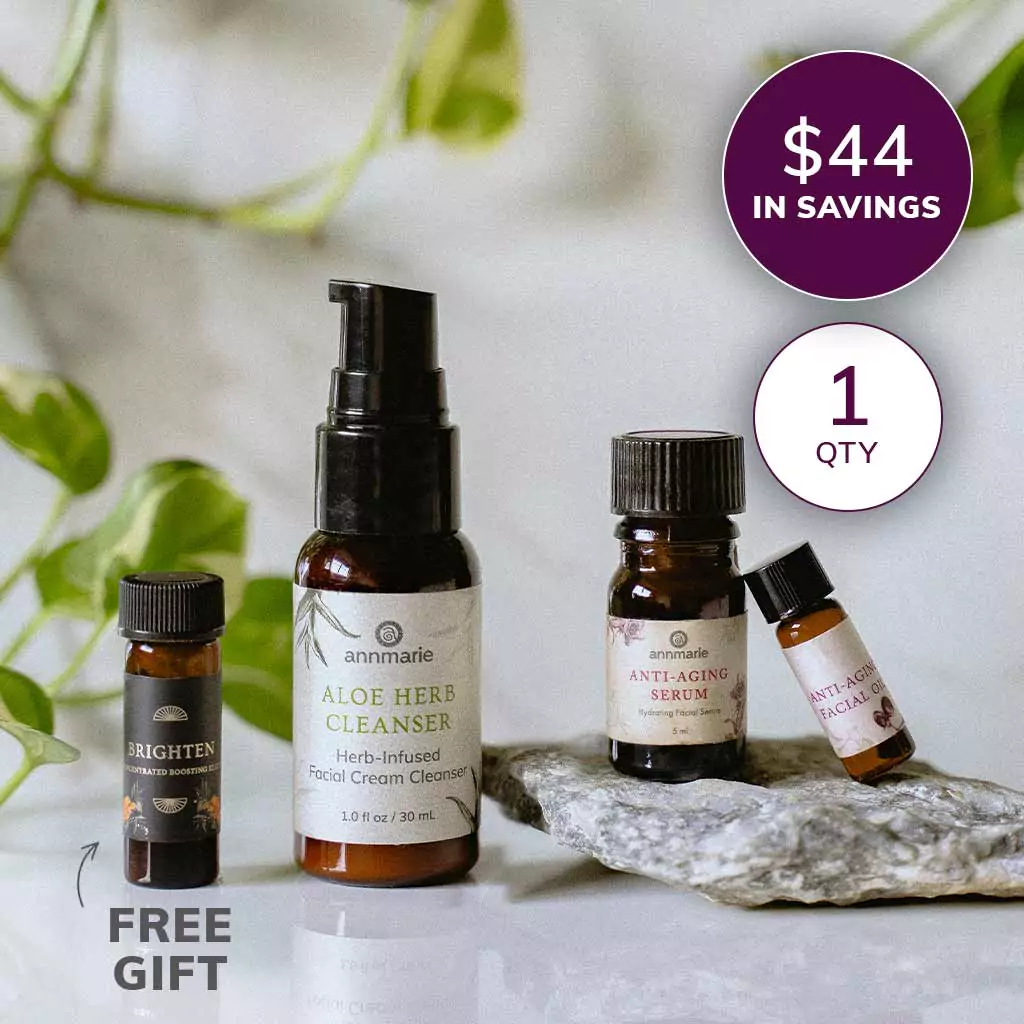
Trial Set Includes:
$66 $21.99 + FREE Shipping + $10 Coupon FOR A FUTURE purchase
*U.S. ONLY
Get 2 and
Save $90
Double Your Purchase And Extend Your Trial
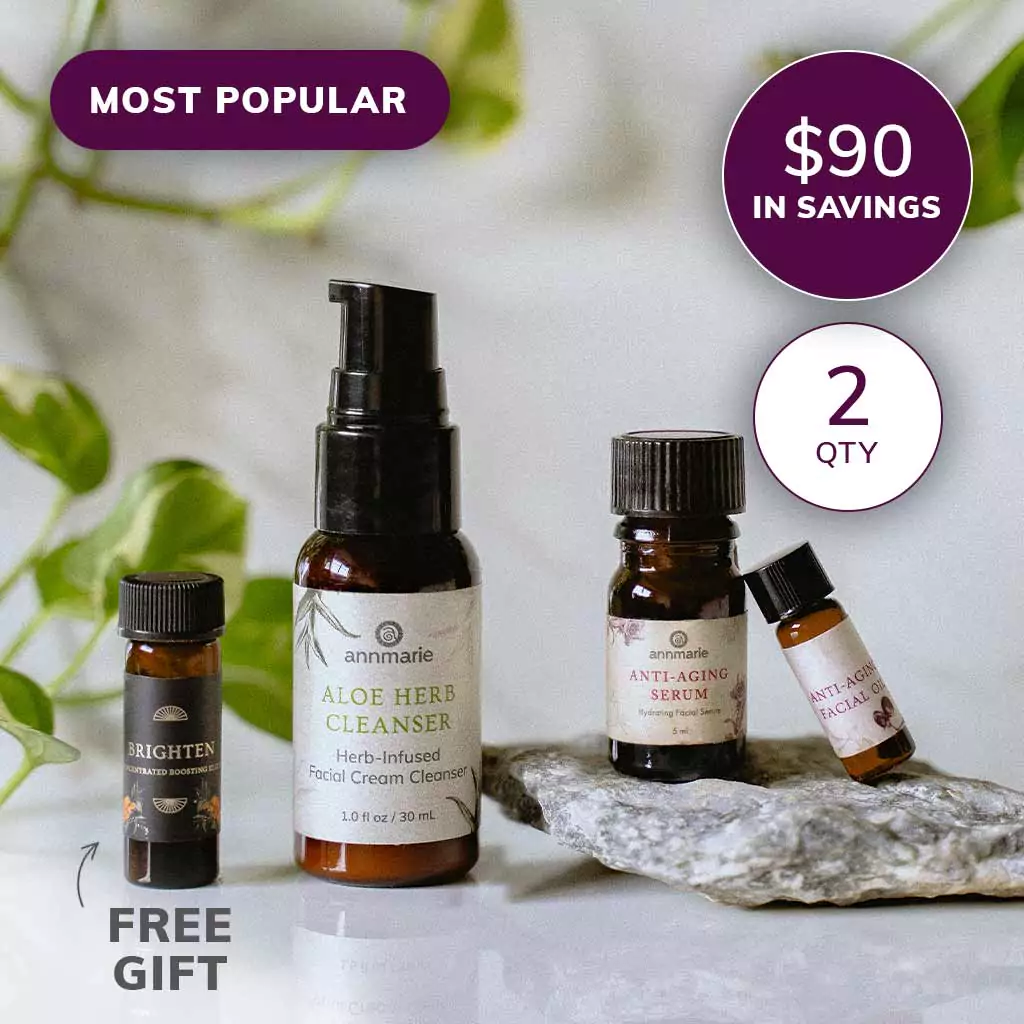
Trial Set Includes:
$132 $41.98 + FREE Shipping + $10 Coupon FOR A FUTURE purchase
*U.S. ONLY
Get 3 and
Save $139.50
Enjoy Even More Time To Experience The Benefits

Trial Set Includes:
$198 $58.50 + FREE Shipping + $10 Coupon FOR A FUTURE purchase
*U.S. ONLY
No commitment required. No subscription. No risk. Money back guaranteed.
Hear Reviews From Our 481,562 Verified Customers
“Amazing company, amazing products”

SILVIE HORKA
“I love all Annmarie's products. Amazing company, amazing products, excellent customer service! Will forever be a customer.*”
“The great minds behind this REALLY care about me'”

LAKIIA NASIR DAY
“This elixir leaves me feeling like the great minds behind this REALLY care about me, this planet and an integrity that can sustain them for generations to come.*”
“My skin started looking brighter and healthier”

SUSAN BEAUREGARD
“I only use Annmarie products on my face. I'm 48 years old and people often mistake me for being in my 30's. My skin started looking brighter and healthier after I'd switched to her products.*”
*Specific results are not guaranteed. Actual results may vary.

FALL IN LOVE
OR YOUR MONEY BACK
With over thousands of 5-star reviews on our products, we feel you'll love them, too! But just in case, your purchase is backed with a complete money-back guarantee. Please contact us within 30 days of your delivery date, and we can work together. If you don't like them, we'll completely refund your purchase, no questions asked. This makes us responsible for delivering you the best possible products and results.
Looking for more skin care guidance?
FAQS
1. How long will it take to receive my order?
You can expect to receive your order within 5-8 business days if you choose the Standard Flat Rate option for US & Canada. Expedited shipping is also available. International shipping times may vary.
2. What is the refund policy?
Your purchase comes with a money-back promise, no questions asked. Simply contact our Customer Care team for more details.
3. How do I use these products?
Morning: Apply the Aloe Herb Cleanser to damp skin, massage into the face, rinse and pat dry. Then follow with the Anti-Aging Serum. Dab Blend Brighten – Vitamin C With Seabuckthorn and the Anti-Aging SerumDab a bit on the nose, chin, cheeks and forehead. Blend well and let dry. Then follow up with the Anti-Aging Facial Oil. Dab on nose, chin, cheeks and forehead. Blend with gentle strokes.
Evening: Apply the Aloe Herb Cleanser to damp skin, massage into the face, rinse and pat dry. Then follow with the Anti-Aging Serum. Dab a bit on the nose, chin, cheeks and forehead. Blend well and let dry. Then follow up with the Anti-Aging Facial Oil. Dab on nose, chin, cheeks and forehead. Blend with gentle strokes.
The AnnMarie Skin Care Story
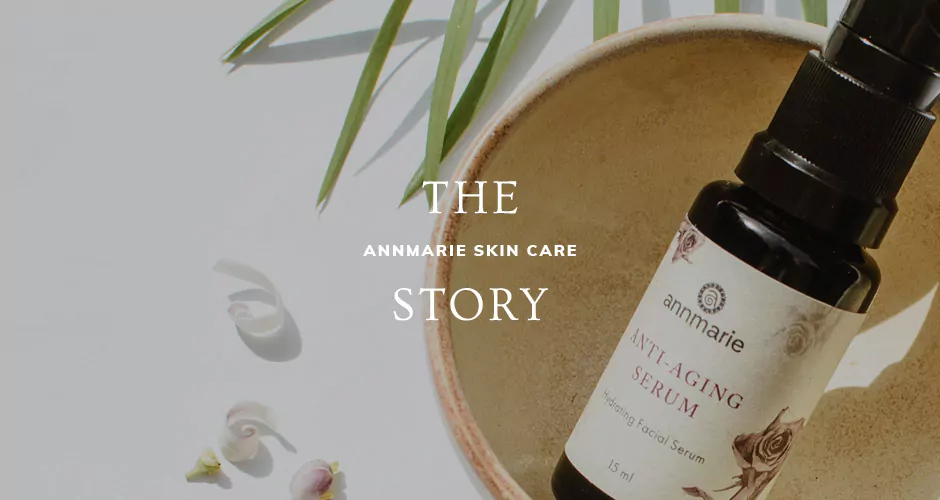
Clean Beauty
Since Day 1

The origin of Annmarie Skin Care began with a cross-country voyage. In 2008, our founders—hosts of a popular YouTube health show—vowed to find the best natural skincare in America.
Left: Co-founders, Kevin and Annmarie Gianni
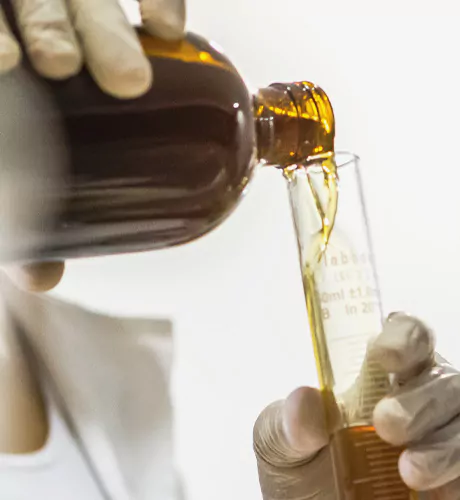
It wasn't easy. They encountered formulators who took shortcuts or shrugged off chemicals—and a beauty industry that encouraged it.
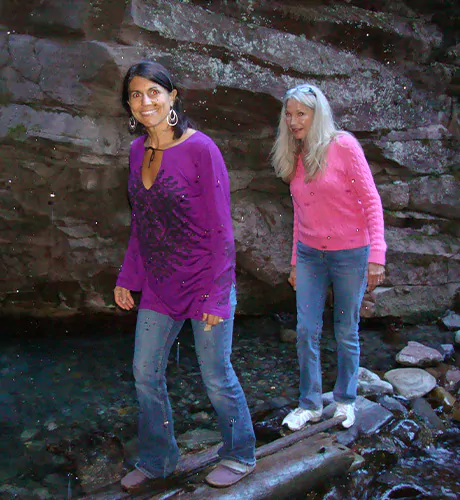
Then, serendipity took hold: they met Bunnie, a chemist, herbalist, and pioneer of plant-based skincare.
Left: Annmarie and Bunnie.
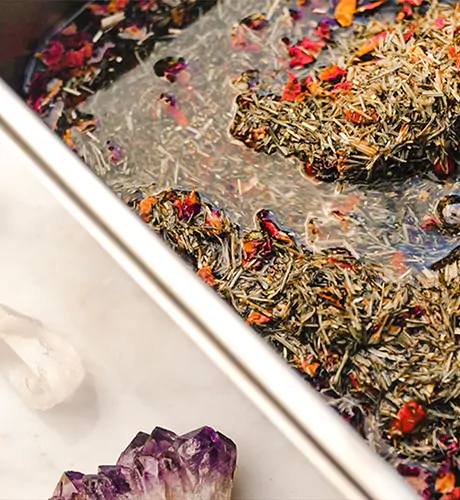
In 2010, Annmarie Skin Care was launched. Each product is made with intention, using our 3-step, Wild. Beautiful. proprietary process. All ingredients are hand-selected, infused in base oils and aloe juice, and then crafted using additional plant extracts to make them as effective as possible.
Left: Hand selected herbs infused into skin nutritive oils for up to 30 days at low heat.
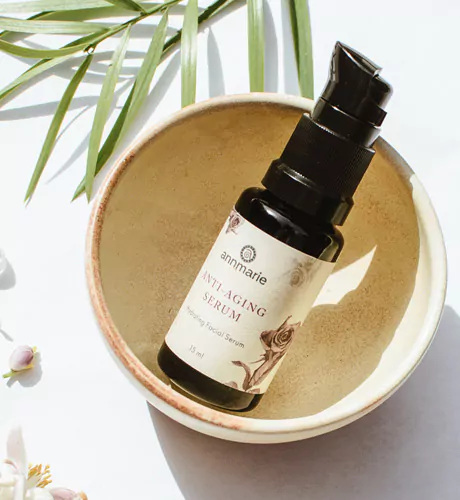
Today, Annmarie and Kevin spread the message about good, clean, effective skin care through consumer education and a product line featuring active, organic, and wildcrafted ingredients that speaks for itself.
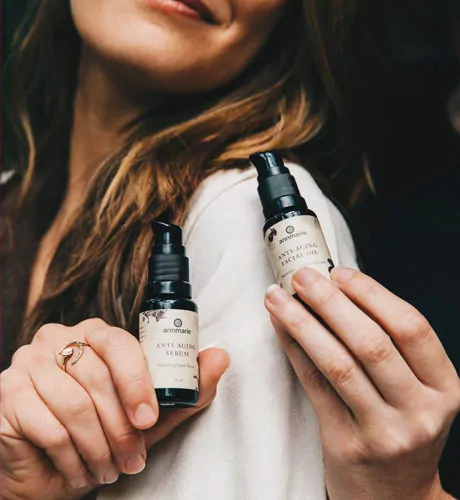
Together with COO Rachel Pachivas, they’ve put together a team that is dedicated to helping people make better decisions about their skin, beauty, and overall health.
Left: COO, Rachel and team member, Jen, holding Annmarie Skin Care Anti-Aging products.
We are committed to bringing you high quality, pure, skin care made with organic ingredients with a sustainable and conscious approach, because we know those values are just as important to us as they are to you.

OUR PROMISE TO YOU
Experience healthier, deeply nourished skin in just a few days—or your money back!
LIMITED STOCK — CLAIM YOURS NOW!
Aloe Herb Cleanser (1 oz)–Gently purifies & refreshes with organic botanicals
Anti-Aging Serum (5 ml)–Hydrates & firms with potent plant-based actives
Anti-Aging Facial Oil (1/2 dram)–Nourishes & restores with antioxidant-rich seed oils
FREE Brighten – Vitamin C With Seabuckthorn (1 dram) ($15 VALUE!)–Visibly brightens & evens skin tone
ALL FOR JUST $21.99 +
FREE SHIPPING!*
PLUS: Get a $10 Coupon for Your Next Purchase!
No commitment required. No subscription. No risk.

